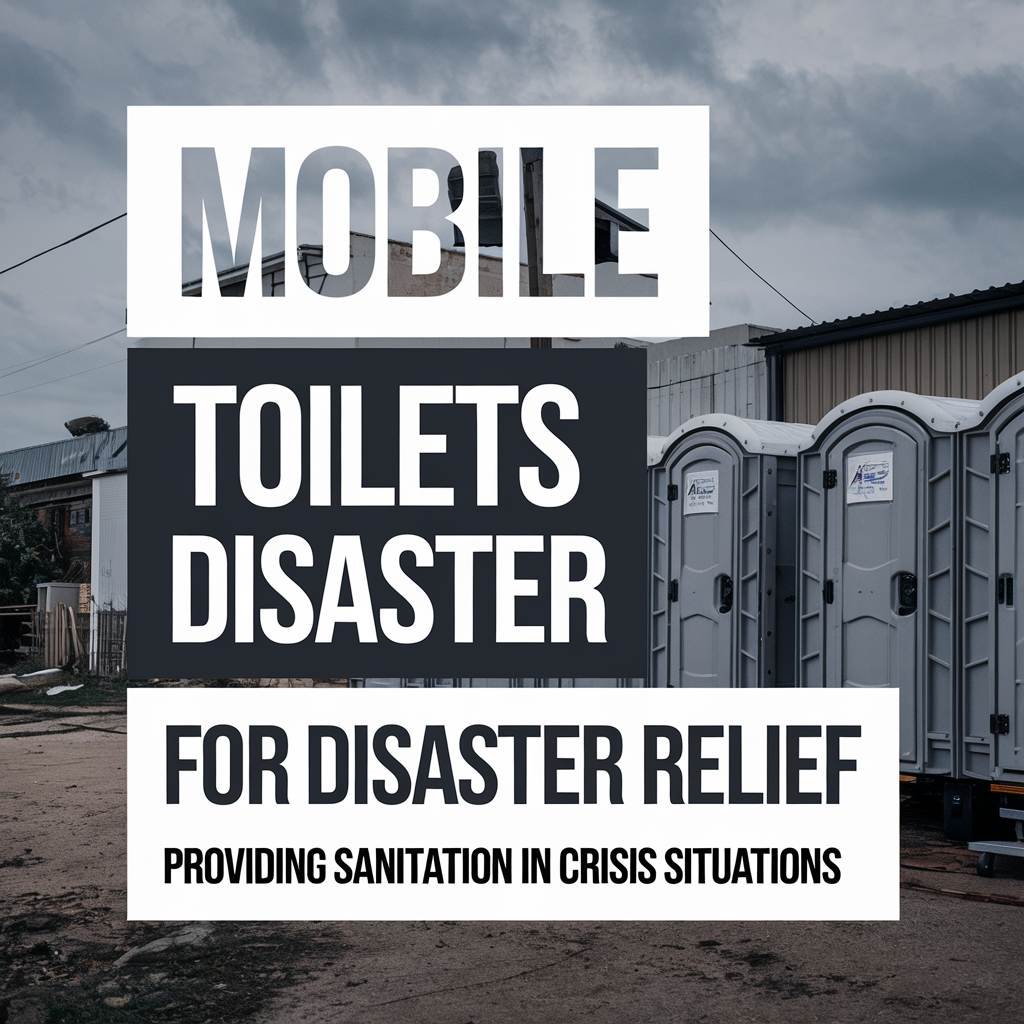- Your cart is empty
- Continue Shopping
Mobile Toilets for Disaster Relief: Providing Sanitation in Crisis Situations

Mobile Toilets for Disaster Relief: Providing Sanitation in Crisis Situations.
In the wake of natural disasters and humanitarian crises, one of the most critical needs is access to safe and sanitary toilet facilities. Lack of sanitation can lead to the spread of diseases, further complicating the situation for already vulnerable populations. In such scenarios, mobile toilets play a vital role in ensuring hygiene and reducing the risk of outbreaks, making them essential tools in disaster relief efforts.
This post delves into the role of mobile toilets in disaster relief, with a specific focus on Nigeria—a country that has faced multiple crises ranging from flooding to conflict-induced displacement.
The Need for Mobile Toilets in Disaster Relief
Nigeria, the most populous country in Africa, has been increasingly vulnerable to natural disasters such as floods, as well as human-induced crises like conflict and displacement. These disasters often leave hundreds of thousands of people displaced, struggling with basic needs such as food, water, and sanitation. Sanitation challenges are one of the most pressing issues in displaced communities. Without proper toilet facilities, open defecation becomes rampant, leading to water contamination and the rapid spread of diseases such as cholera, diarrhea, and typhoid. For this reason, mobile toilets have become indispensable in providing immediate, temporary sanitation solutions in disaster-affected areas.
Case Study: Mobile Toilets in Nigeria’s Flood-Affected Communities

- The 2022 Flooding Crisis
In 2022, Nigeria experienced one of its worst flood disasters in over a decade. Heavy rainfall and river overflows displaced more than 1.4 million people across 33 states, leading to a dire need for humanitarian assistance. Among the most critical needs was access to safe and functional sanitation facilities for the displaced population.
In response, several humanitarian organizations, including the Nigerian Red Cross and the United Nations, deployed mobile toilets to flood-affected regions. These portable units were essential in preventing the spread of diseases, as floodwaters often carry contaminants and sewage into water sources used for drinking and bathing.
2. Preventing Disease Outbreak
one of the greatest risks during floods is the outbreak of waterborne diseases like cholera. In past disasters, Nigeria had seen spikes in cholera cases due to poor sanitation in makeshift camps and affected communities. However, in 2022, the timely deployment of mobile toilets helped mitigate this risk. These mobile units provided clean, safe alternatives to open defecation, drastically reducing the likelihood of disease transmission.
3. Scalability and Flexibility
Mobile toilets are highly adaptable, making them perfect for disaster relief. In Nigeria’s flood-affected regions, these units were placed in strategic locations such as temporary shelters, schools converted into evacuation centers, and other high-traffic areas. The flexibility of mobile toilets allowed relief organizations to move them as needed, ensuring all communities had access to sanitation facilities.
4. Supporting Dignity and Privacy
Beyond addressing hygiene, mobile toilets also provided privacy and dignity to displaced families. Disasters often strip individuals of their sense of normalcy, but providing private and clean sanitation helps restore some of that lost dignity. This is particularly important for women and girls, who often face additional vulnerabilities in disaster situations.
Mobile Toilets for Conflict-Induced Displacement in Nigeria
Nigeria is also grappling with a long-standing conflict in its northeastern region, where Boko Haram insurgency has displaced millions of people. The humanitarian crisis in this region has led to the establishment of numerous internally displaced persons (IDP) camps. Access to safe water and sanitation has been a persistent issue in these camps.
To address these challenges, mobile toilets have been deployed in IDP camps in states like Borno, Yobe, and Adamawa. These toilets are part of larger water, sanitation, and hygiene (WASH) initiatives aimed at improving overall living conditions in the camps. The mobile toilets help prevent the spread of diseases and improve the quality of life for the displaced populations living in crowded, often unsanitary conditions.
Why Mobile Toilets Are Essential in Nigeria’s Disaster Relief Efforts
1. Rapid Deployment Mobile toilets can be transported and set up quickly in disaster-hit areas, making them a critical tool for immediate response. In Nigeria, they have been used in both conflict zones and flood-affected regions, providing fast solutions where traditional toilet infrastructure is damaged or non-existent.
2. Adaptable to Challenging Environments Many parts of Nigeria affected by disasters, particularly rural and remote regions, are difficult to reach. Mobile toilets are designed for versatility, allowing them to be set up in a variety of terrains and conditions.
3. Promoting Public Health By offering safe alternatives to open defecation, mobile toilets reduce contamination of water sources and prevent the spread of diseases. This is particularly important in densely populated areas like IDP camps, where sanitation challenges can escalate into public health crises.
4. Supporting Long-Term Recovery While mobile toilets are typically seen as a short-term solution, they also play a role in the longer recovery process. In flood-affected areas, for example, they remain in use until permanent sanitation infrastructure can be rebuilt, ensuring that the community’s hygiene needs are met throughout the recovery phase.
Conclusion
In Nigeria’s disaster-prone regions, mobile toilets have become a cornerstone of disaster relief efforts. From flood-affected communities to conflict-induced IDP camps, these portable sanitation units offer a lifeline by providing quick, adaptable, and effective sanitation solutions. By helping to prevent disease outbreaks, protect public health, and restore dignity to displaced populations, mobile toilets play an indispensable role in maintaining the health and well-being of those affected by crises.
As climate change continues to exacerbate the frequency and intensity of natural disasters in Nigeria, the importance of mobile toilets in disaster preparedness and relief will only grow. Investing in these solutions can significantly improve the country’s ability to respond to future crises and protect its most vulnerable citizens.
In the face of disaster, mobile toilets are more than a convenience—they are a critical component of saving lives.
Interested in buying or renting a mobile toilet visit now Sachio Express